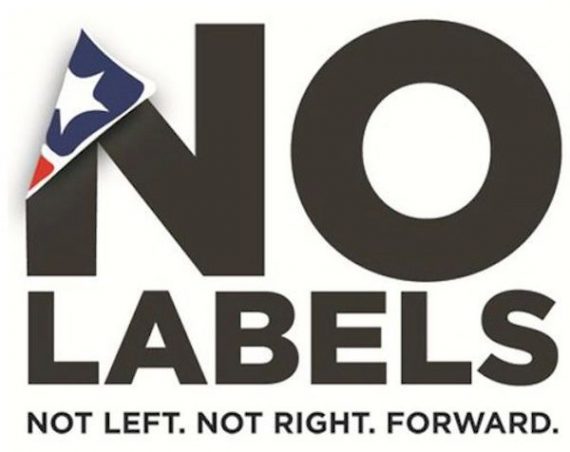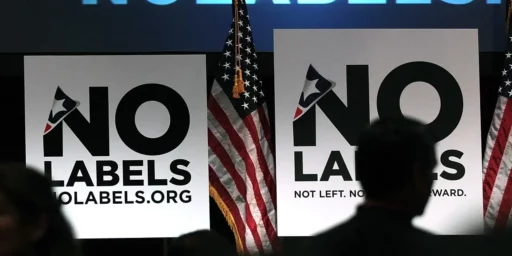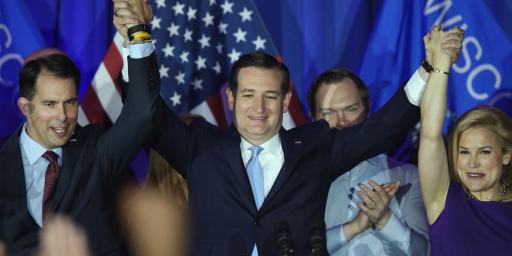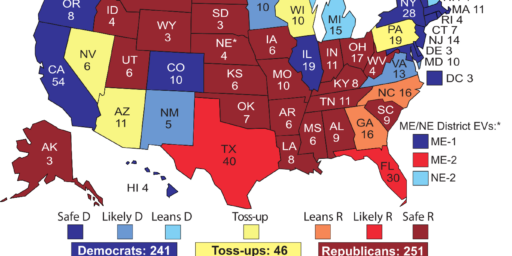How Serious of a Threat is a No Labels Candidate?
The panic continues. Is it warranted?

So, WaPo has a column this morning in what seems to be an ongoing panic about a possible No Labels candidate for office: A No Labels candidate would likely throw the election to Trump. I noted a similar piece from the Bulwark in March and have seen several other iterations since then.
The basic thesis is as follows:
But a third-party candidate dramatically changes the equation. If he or she takes even a small part of the anti-Trump vote away from Biden, Trump is likely to be returned to the White House. That’s why the No Labels effort poses such a danger to our democracy.
The problem with this assertion is that it is not necessarily true. Now, I am not saying it isn’t true, either. Moreover, I understand the concern. But without knowing key pieces of information like who this candidate would be and how much money No Labels would be able to spend on that candidate, it is really hard to judge the impact an NL candidate would have, even as a matter of a speculative conversation (which is all we have here).
So, yes, this is a real concern:
In the five states — Arizona, Georgia, Michigan, Pennsylvania and Wisconsin — most likely to decide the 2024 election in the electoral college, the numbers tell the story. Together, they have 73 electoral votes. In 2016, Trump narrowly won all of them. In 2020, Biden did.
In all five of these swing states, Biden’s razor-thin margins came from a massive anti-Trump vote. In all of them, at least 1 in 3 Biden voters said they voted mainly against Trump; in Wisconsin, that number was 38 percent; in Arizona (where No Labels has already secured a spot on the 2024 ballot) a whopping 45 percent.
FWIW, the Liberatarian candidate won 1.2% of the vote for president in Georgia in 2020 (the number was 1.5% in AZ). Would an NL candidate draw more? Less? The same? What would have happened in 2020 if the Libertarian hadn’t run? Would that have helped Trump or Biden? Would the NL candidate mostly steal from the Libertarians?
More to the point, we really don’t know from whence an NL candidate’s vote would come, and in what proportion. It is not out of the question that an NL candidate could help Biden as some GOP voters who simply won’t pull the lever for a Democrat might vote for some hypothetical NL person.
But, to the point of this post, we don’t even know who the candidate will be.
So look, I get it. The possibility of Trump back in the White House is pretty horrifying, and gets moreso on the daily. But the panic over a NL candidate seems a be overwrought to me and is based on a slew of assumptions.
Obligatory note: No Labels is a label.






I had a similar thought when reading the piece this morning. I suppose a Mitt Romney-Mike Bloomberg ticket or some such would draw a significant number of votes from #NeverTrumpers who don’t want to vote for Biden. But, by and large, these alternative parties put up relative nobodies who get so few votes as to be meaningless.
I’ve seen so many third-party threats over the years that never come to fruition that I’ve started to become jaded about it, and there’s a danger of that turning into complacency. But I do feel that the issue is overblown a lot of the time.
One claim I’ve often heard from liberals over the years is that Jill Stein may have been at least partially responsible for Trump’s 2016 victory. They point to the fact that her share of the vote in WI, MI, and PA was larger than the margin separating Trump from Clinton in those states. I sometimes hear other people counter that the Libertarian candidate, Gary Johnson, took an even larger chunk of the vote and that it probably came from potential Trump voters–therefore the spoiler effect of Stein’s candidacy was counterbalanced by the Johnson effect on the Republican side.
Neither of those assumptions stand up to scrutiny. There’s just one poll I’m aware of that asked about the second choices of Johnson and Stein voters, and this is what it found:
In other words, if this poll is accurate, then both Johnson and Stein voters drew slightly more from Clinton than Trump, though the majority of voters for either candidate simply wouldn’t have voted in a two-candidate race between Clinton and Trump. That’s a point that often gets missed in discussions of the spoiler effect of third-party candidates, that they draw in a lot of nonvoters or infrequent voters, which dilutes any spoiler effect the candidates might have.
Now, I do definitely believe that Ralph Nader was a spoiler to Al Gore in 2000. Bush ultimately beat Gore in Florida by 537 votes, while Nader took in over 97,000 total votes in the state. Even if only a tiny percentage of Nader voters in the net took votes for Gore, it was probably enough to swing the state to Bush (putting aside the whole vote-counting controversy). But let’s just say that wasn’t a typical situation. Even in relatively narrow elections like 2016, the margins are probably large enough that the outcome can’t be blamed on third parties.
I believe I have read that the people behind that effort are right-wing donors, which feeds the concern, considering the backers know they are mostly just affecting which major party wins.
Thus, whatever their choice of candidate and where to spend.
@Kylopod:
Assuming honest answers to the pollsters, possibly a bad assumption. Also, polls conducted long after an election (how you voted) notoriously yield implausible results.
@charontwo: I have no doubt it’s largely a right-wing attempt, though some of the individuals involved in it may simply be useful idiots.
Whether it works is a different question. In 2020 there’s no question in my mind the Trump people were trying to prop up Kanye’s candidacy because they believed it would siphon votes from Biden. Kanye only ended up getting on the ballot in one state that could remotely be described as a swing state–Minnesota–and his share of the vote turned out to be minuscule, while Biden carried the state by a pretty solid margin. (Trump also thought he could flip the state by appealing to white backlash against the George Floyd protests. He did well in the rural parts of the state, but Biden wildly overperformed in the Twin Cities area, including the suburbs.) In any case, it’s not even clear the tiny number of votes Kanye received came more from potential Biden voters.
I remember when a lot of people were pushing for Colin Powell to run as the candidate for the GOP based on the fact that he was a “centrist” and a “unifier”. He was well regarded across the political spectrum and had a very high approval rating.
At the time I was reading an article that basically said something to the effect of, “.. sure everyone loves Colin Powell and yes his approval rating is sky high and it will probably stay that way until someone asked him one question… what is your stance on abortion?”
That’s the rub right there. There are no parties only a lose confederation of hot button policy topics.
As long as you can talk about progress, freedom, and moving the country forward in abstract language people will love you. It’s when you get down to explaining your stance on specific policy issues that you will be sorted into the left / right dichotomy. Then you become just another Republican or Democratic in an underfunded party. I can’t remember if either Ross Perot or John Anderson even won one state.
Groups like no labels would be much better off trying to pick off house seats in state legislatures but that isn’t as ego satisfying.
In our current system the deck is stacked to give the two major parties a such a significant advantage that all a their party can hope for is to swing the election to a candidate that does not share their policy preferences. there is evidence that Perot probably helped Clinton and that Ralph Nader helped Bush. I’m glad that Bernie Sanders had the good sense to not try it in 2020
Third party runs are nothing but spoiler campaigns and anyone who tells you differently is either deluded or counting on it. So rather then run for president, why not run for lower office were you might have a chance? Because it more about ego, delusion, and a morbid sense of self-importance than it is to actually serve the people.
@Rick DeMent:
They didn’t.
No, there isn’t. This is one of the great myths of modern American political history. There’s a mountain of evidence that Perot drew about equally from Clinton and Bush, as well as substantially from people who normally didn’t vote. See here for the specific research. But, also, it’s important to point out that Bush’s approval rating was in the 30s throughout the entire year, even before Perot jumped in the race. And in the period where Perot temporarily dropped out of the race, Clinton was leading Bush with a solid majority of the vote. The notion that Bush was on track to win the election except for Perot’s presence on the ballot is simply not credible.
No Labels does not market itself as fringe, and they aren’t aiming for fringe Jill Stein-like candidates. But will any real politician like Mitt Romney be out on the campaign trail looking for maybe 2% of the vote? I doubt it. It would be degrading beyond belief.
I’m willing to bet No Labels does nothing, nothing at all: except for not returning the donors’ money, which is its purpose.
@Kylopod:
Ok, but how do the numbers add up, assuming the answers for the poll would have played out like that?
Here’s my math curse. I know what needs to be done, but can’t do it easily.
So from the total votes per state, we need to deduct the number of third-party voters who wouldn’t have voted. Then add to Clinton and Benito the percentage of those who’d have voted for them. Then see who would have had the most votes overall and taken all the EC votes.
If the results stay the same and Clinton still looses, then the third-party candidates had no effect. I don’t know the answer.
Third-party candidates get their best results when voters are unhappy with the two parties’ choices. See especially 2016. Assuming that Biden and Trump get the nominations, we could see a similar dynamic since both are – currently at least – very unpopular.
The Libertarians will probably already be a third-party option in every state, and many states will have varying degrees of others like Greens, or whatever. People who don’t like the two main candidates will have other options to choose from, whether anyone likes it or not. No Labels is just another option to add to that list, and I kind of doubt they have the money or organization to get on the ballot in all 50 states.
It’s also weird to suggest that third-party candidates are a “danger to democracy” as if fewer choices are somehow less democratic.
@Kathy: I did the calculations a while back, plugging the percentages into their statewide totals in the key swing states and seeing what happened. In all of them, it didn’t affect the results.
Of course I’m not under any illusions that this is necessarily accurate. Besides problems with the poll itself, it was a question asked nationally. That doesn’t necessarily predict how the numbers will break down within a particular state.
I cite this poll because it’s the only one of its kind that exists, to my knowledge. There simply isn’t the kind of extensive data we have about Perot in 1992. I’m not citing it because I believe it definitively settles the question of what impact Stein or Johnson had on the race, I’m just trying to warn people against making simplistic assumptions, like suggesting that every Stein vote is a vote that would otherwise have gone for Clinton.
@Andy:
I’m not against there being more parties and more candidates in principle. There are many countries that function fine with more than two parties regularly winning office. The US system just isn’t currently set up that way. Third parties never win (except maybe on occasion very locally), so the only impact they usually have is to siphon votes from the major-party candidates, and since that usually mean the party they’re most similar to ideologically, their presence leads to outcomes that are contrary to what they claim to believe. That’s exactly what happened with Nader in 2000.
If we had national ranked choice and/or proportional representation, that would be a different story.
The reason people are describing the third parties in question as a threat to democracy is because their only plausible impact is to make it likelier that Trump, a would-be authoritarian who already attempted to overthrow our democracy, will win another term. This is not rocket science.
¡BREAKING NEWS!
Cornel West jumps from People’s Party to Green Party!
@Andy:
The Libertarian Party is probably not going to be able to accomplish much this time around. The national party has been taken over by a divisive faction and is “at war” with several of the state parties. There will almost certainly be battles over which candidate gets on some state ballots. Having the same candidate on all 50 is not a given.
https://twitter.com/TheRickWilson/status/1669327042398261249
@charontwo: Thank you for posting this. As in most cases it boils down to only two things, money and power.
@Kylopod:
Thanks, that clarifies things further.
Of course, if the data is low quality, the answer you derive won’t be definitive. But it does point to a trend.
@Mu Yixiao:
Yup, thanks to the Misses Caucus takeover, the National Party seems to be interested in proving every negative characterization of Libertarianism right–especially the racist characterizations.
@charontwo:
I think I remember that, but I thought it was the Goldfinger Rule:
Once is happenstance. Twice is coincidence. Thrice is enemy action.
@Mu Yixiao:
Thanks! I don’t follow the Libertarian party at all and was unaware of that.
@Kylopod:
As you posted up the thread, the impact of third-party voters isn’t necessarily helpful to one side or another. It depends on a lot of factors that we don’t know at this point, so cannot conclude whether it would theoretically help Trump or not. And a lack of other choices will simply mean fewer people will vote – which doesn’t sound very democratic to me.
If the vote split for third parties is really what stands between another Trump Presidency and us, then we’re already fucked.
@Andy:
Is that so? Historically the elections with higher-than-normal third-party voting are not the ones with the highest overall turnout. In any case, if the added “choices” are candidates with no serious chance of winning, that’s not my idea of greater democracy. My idea of greater democracy is promoting election reforms that enable greater representation—which will, among other things, give third parties more opportunities.
I disagree. No matter what it says about this country that a candidate like Trump can win under the right circumstances, there’s a fundamental difference between him winning and him not winning.
@charontwo:
I am not/have not been familiar with calling it that, but as “What I tell you three times is true.” The same concept has occurred elsewhere, IOW.
@Kylopod:
The poll you cited in your first comment specifically said that a solid majority of third-party voters would not have voted at all in a strictly binary contest. Maybe they are lying, I don’t know. But the idea that restricting choices to only two (by whatever means necessary) will result in more people voting is – at best- counterintuitive. And it’s definitely undemocratic. It’s not like the deck isn’t already highly stacked and skewed against third parties.
Of course there is a huge difference between him winning and not winning. I definitely do NOT want Trump to win. The question is, what are you willing to do, and how many eggs are you willing to break to ensure that doesn’t happen? The conundrum in the argument is that to help ensure Trump doesn’t win, you are suggesting that we need to break a few eggs and take away choices to try to force more people to vote for Biden. That’s undemocratic. Maybe that’s the lesser evil and burning part of the village is necessary to save it, but that’s a different argument.
Secondly, if you run a bad candidate opposite of Trump (and Biden, who I like and voted for, isn’t a great candidate this time around), then you are put in the position of attempting to convince people to engage in voting strategery instead of their normal instincts. There is only so much you can do to convince, cajole, or bully voters into voting for a weak candidate – a lesson the Republicans learned last cycle and Democrats should remember from 2016.
This is a big reason why I wish Biden had bowed out and let the Democrats run someone else because it’s clear that Biden has sginificant negatives that he can’t overcome. He’s going to lose votes because of his age – everyone understands that, the only question is how many. So if Trump wins, -the- major factor will likely be Biden’s age and unpopularity if that doesn’t improve.
So, if voters think both candidates are unfit and vote third party, the problem is not those voters, the problem is weak major-party candidates. Candidate quality matters. Candidates need to appeal to the maximum number of voters possible, they can’t depend entirely on negative partisanship and appeals for voter strategery to get them over the finish line.
@Andy:
I don’t think they’re lying. At the very least, I see no reason to assume they’re lying. It isn’t a contradiction to my point about turnout, because it’s only one slice of the populace we’re looking at. As you pointed out earlier, high third-party-voting is usually a sign of dissatisfaction with both of the major-party candidates. The amount of third-party-voters who otherwise wouldn’t have voted may be smaller than the amount of potential voters who didn’t vote, period. So in the net, it’s an environment that leads to less voting.
I’m not calling for restrictions. Getting on a presidential ballot is hard, but virtually all of them have more than two candidates, and it’s common for there to be around a half-dozen or more in addition to a write-in option. It’s just that most of those candidates don’t have a prayer of winning. When someone more prominent than usual like Cornel West or Joe Manchin runs, the only thing that’s changed is their likelihood of getting a greater number of votes than usual for a third-party candidate; their chances of winning are still astronomically low. That barely constitutes giving voters more choices.
This is among the reasons why I’m a supporter of ranked choice; it reduces (if not eliminates) the spoiler effect of third-party candidates, but it also encourages greater ability to support third-party candidates. If Florida in 2000 had used ranked-choice, not only do I believe Gore would have won the state handily, but the Green Party would have won more votes in part because voters who liked Nader wouldn’t have been as afraid of spoiling the election for Gore. It doesn’t have to be zero sum, but in the current system, it is, and given that a fractured field makes it likelier the winning candidate will fail to win an absolute majority (and sometimes even a plurality), that is not a recipe for stronger democracy.
This third party stuff …
Ross Perot got Bill Clinton elected in 1992, and Ralph Nader got George W Bush elected in 2000.
And, Jill Stein? Don’t get me started …
I live in an extremely liberal country suburb and I have neighbors who called themselves progressives who voted for Jill Stein in 2016 because they really really disliked Hillary Clinton, and this being CA voting for Stein wasn’t going to cost them anything. I remember saying to them that this election was all about who gets to nominate people to the Supreme Court, and I’d rather have ANY Democrat doing this than ANY Republican. They were undeterred and voted for Stein.
Epilogue: After Trump nominated Gorsuch I asked them how they liked Trump’s nomination to the Court, and they said, paraphrasing, ‘well we don’t know yet if he’s as bad as you say.’ After Trump nominated Kavanaugh I asked them how they liked THAT nomination, they said, paraphrasing, ‘Hillary was a terrible candidate.’
Yes, I was being a brat, I know that. But, people need to have their eyes wide open before they make that vanity vote for a third party candidate.
@al Ameda:
(sigh) No, he didn’t. See earlier in the thread.
@Kylopod:
I’m not enamored of ranked choice, but I think it is better than what we have now.
Fundamentally, though, I think the main problem is our primary system and weak parties, which is what allowed Trump to capture and take over the GoP.
@al Ameda:
Honestly, I think bad ballot design (see the butterfly ballot in Florida) and SCOTUS got Bush elected more than Nader (plus, and most important of all, the Electoral College).
@Steven L. Taylor:
There are a ton of individual things that were probably decisive in that election. That’s true about all close elections, and of course there’s never been a closer one in our history. “If X happened, Gore would have become president” is not mutually exclusive with “If Y happened, Gore would have become president.” Gore’s selection of Lieberman as vp was probably, all by itself, a fatal blunder. (What if he’d picked Florida’s Bob Graham, or NH’s Jeanne Sheehan, for example?) But that doesn’t mean Nader’s candidacy wasn’t, in itself, decisive. If Nader hadn’t been on the ballot in Florida, I believe Gore would have handily won the state, and the election. Therefore, it’s a good illustration of the negative impact of third-party candidates. It doesn’t in any way mean that nothing else that happened contributed to Gore’s (supposed) defeat.
@Kylopod: All fair.
Note that I said X and Y were “more” important than Z.
I am not claiming that Z didn’t matter (nor that other variables didn’t matter).
But, if I had to pick the #1 variable, I would go with the butterfly ballot.
And, speaking of third-party candidates, the butterfly ballot design issue lead to Pat Buchanan winning more votes than he likely would have (and those votes likely were intended for Gore).